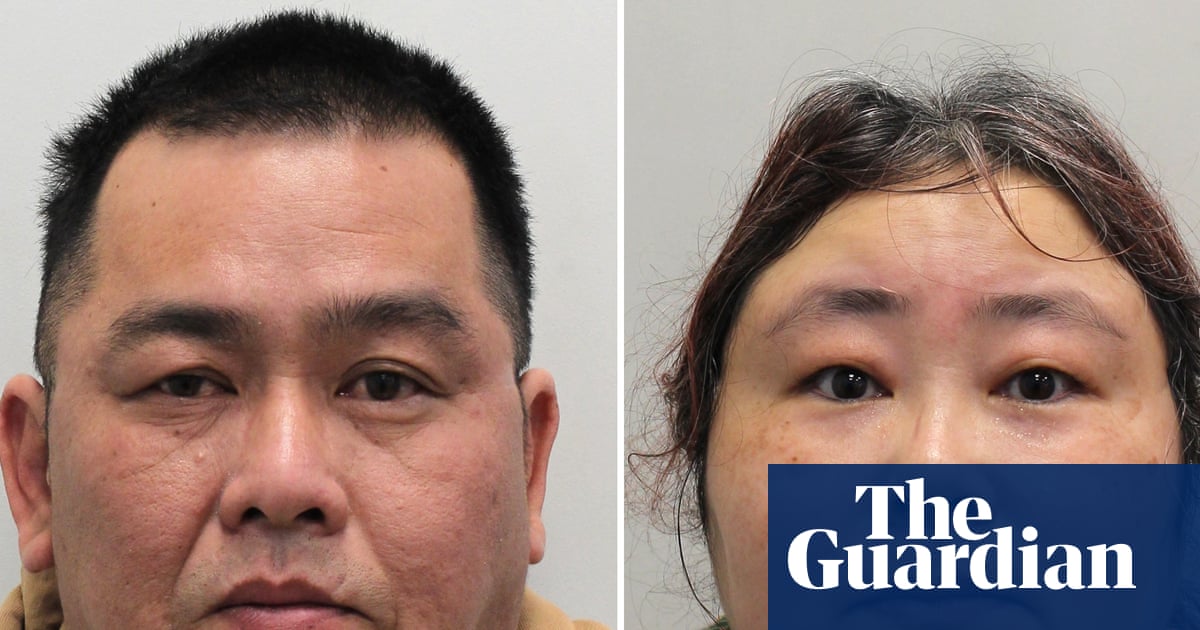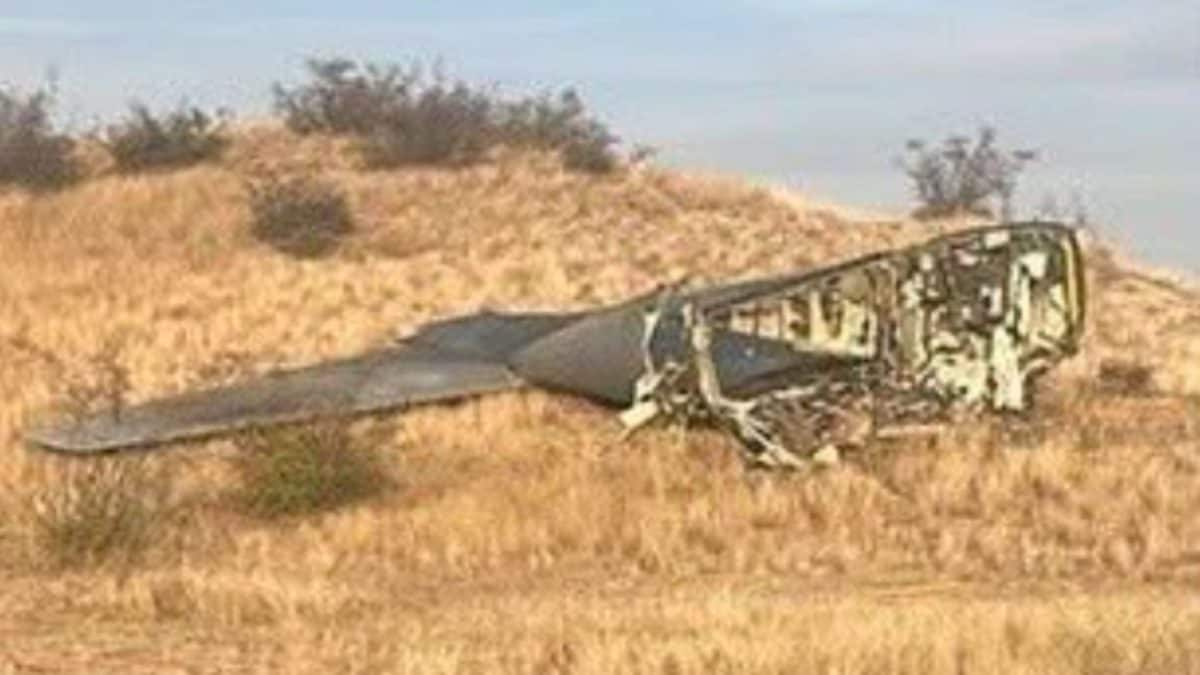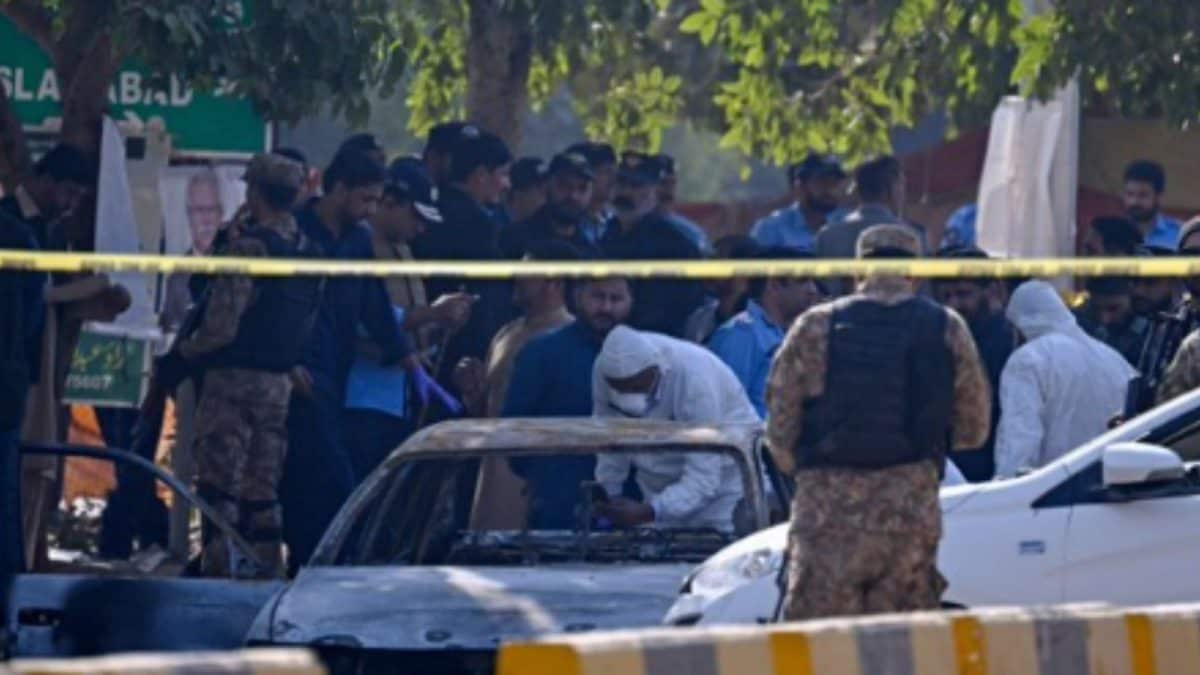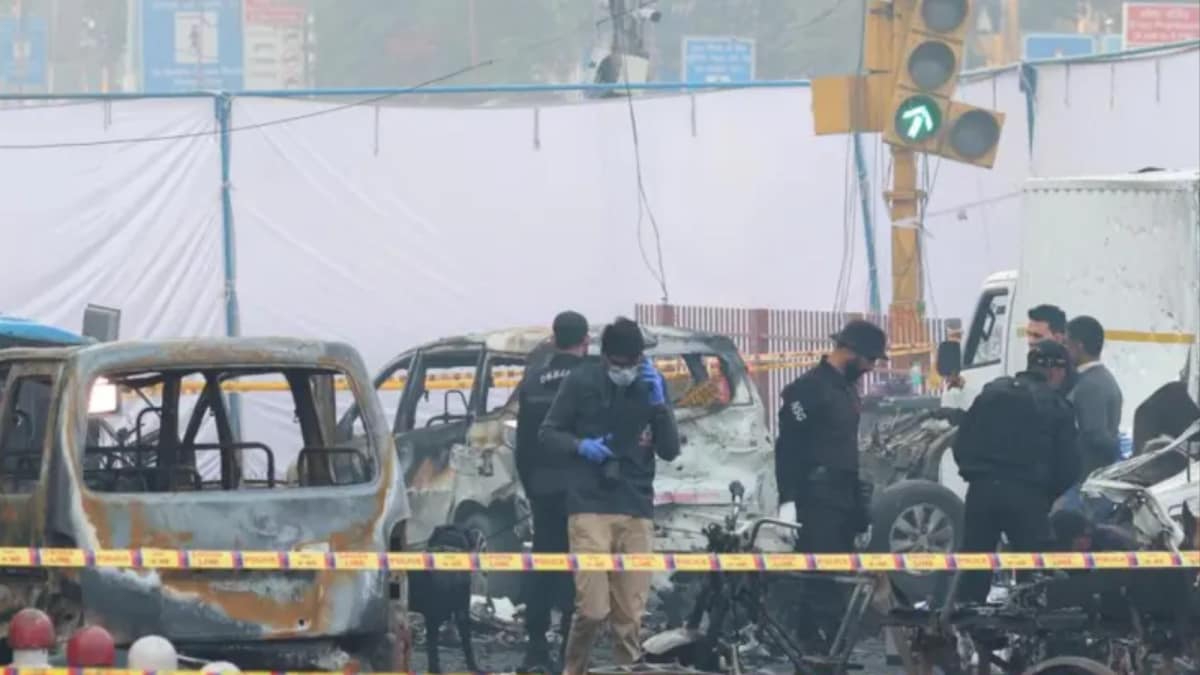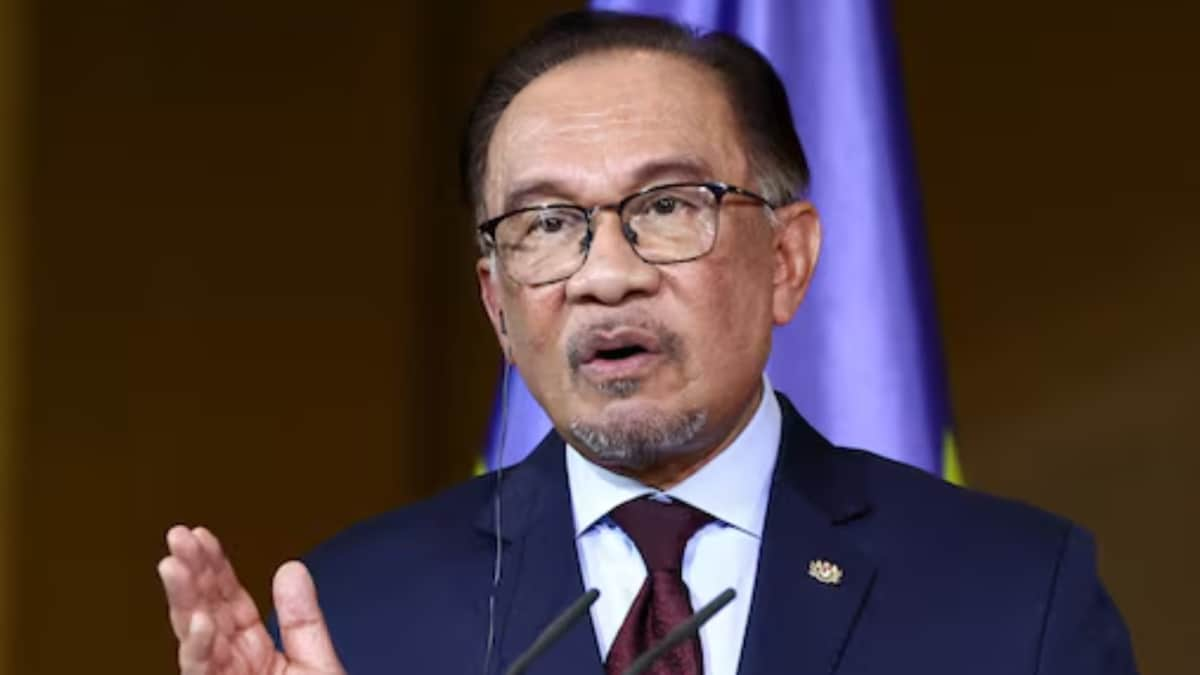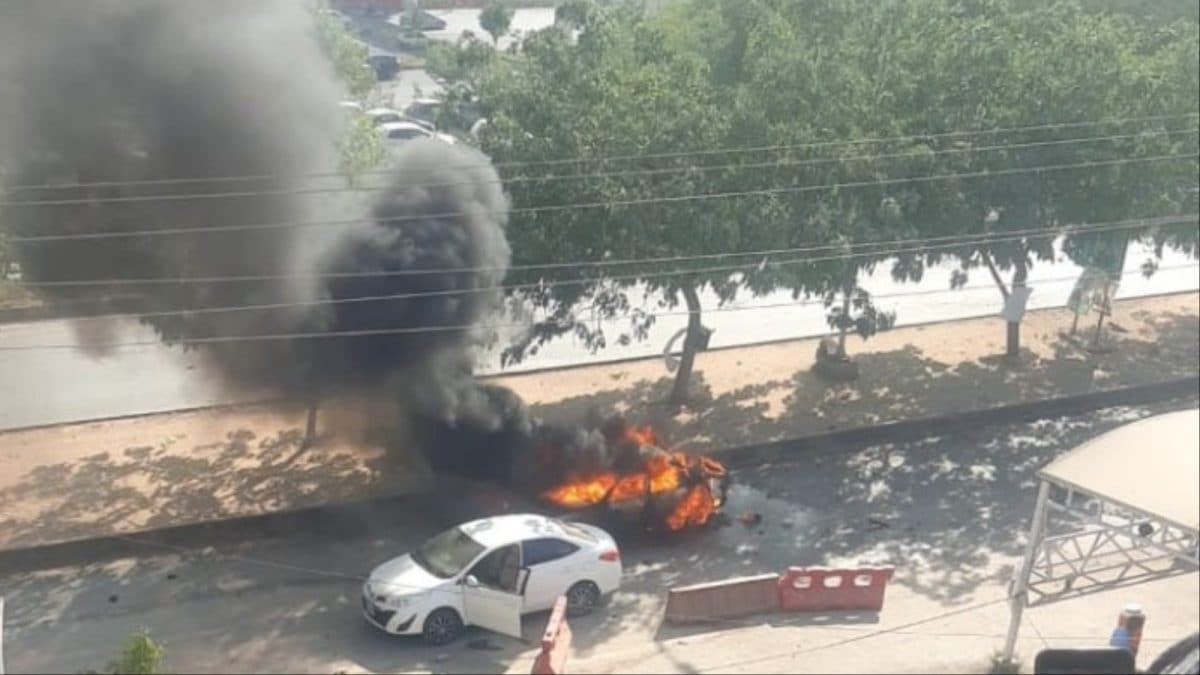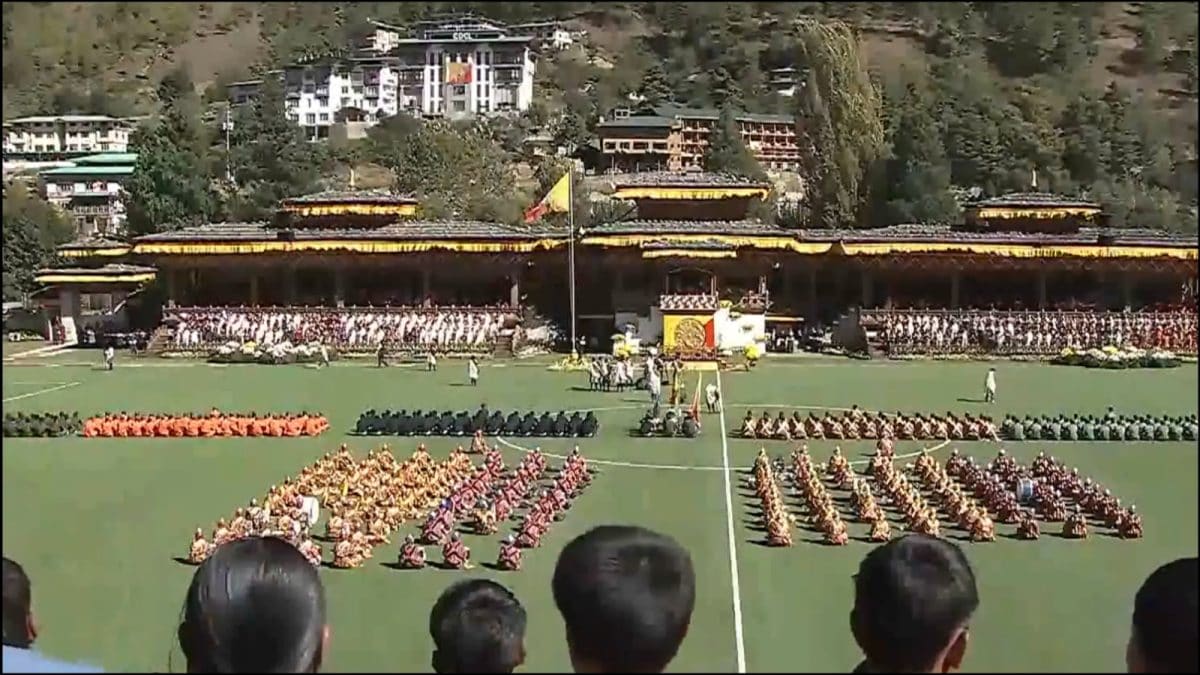Crowds gather in Warsaw as controversial Independence March gets under way

Jakub Krupa
Meanwhile over in Poland, tens of thousands of people are taking part in the Independence March in Warsaw, organised primarily by nationalist and far-right groups under the slogan “One nation, strong Poland.”
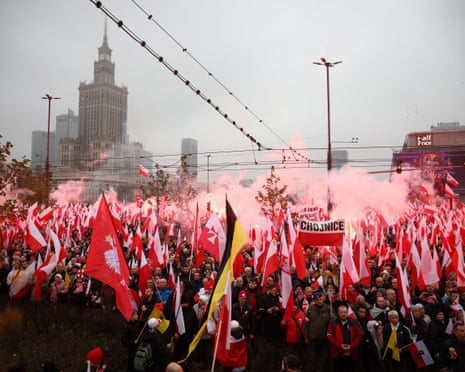
Despite the solemn occasion of the 107th anniversary of the Polish independence day, the event continues to deeply polarise the general public as it attracts thousands of conservatives Poles willing to celebrate the country’s history, but also fringe, far-right and radical groups.
An SW Research poll for Rzeczpospolita showed that 45% of Poles have a positive view of the march, but 28% is of the opposite view. 26% have no opinion about the event.
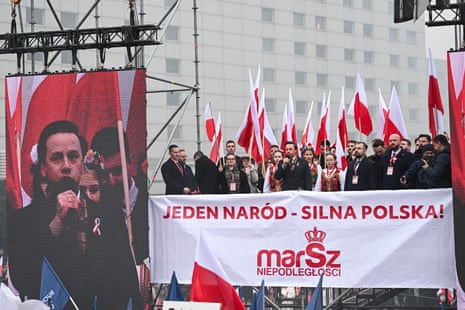
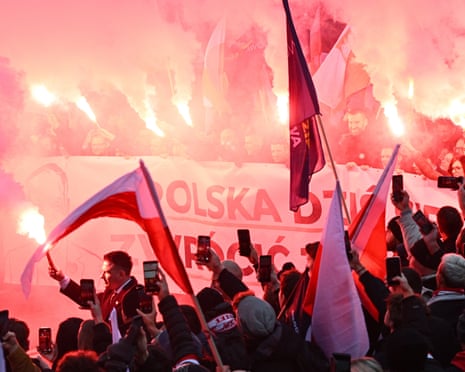
Some far-right slogans can be also seen on flags carried on the fringes of the march, including “Stop immigration, time for deportation.”
In the past, the event had been marred by violent clashes with police and counterprotesters, with controversies about reported attendance of other far-right groups from across Europe.
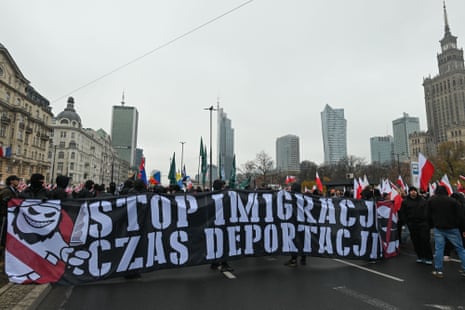
Official state commemorations took place earlier today, with president Karol Nawrocki and senior government ministers taking part in a formal ceremony at Piłsudski Square in Warsaw.
Earlier in the morning, Nawrocki also laid wreaths at monuments commemorating Poland’s founding figures, and he was expected to join the march during the afternoon.


Poland’s prime minister Donald Tusk attended a separate event in his home town of Gdańsk.
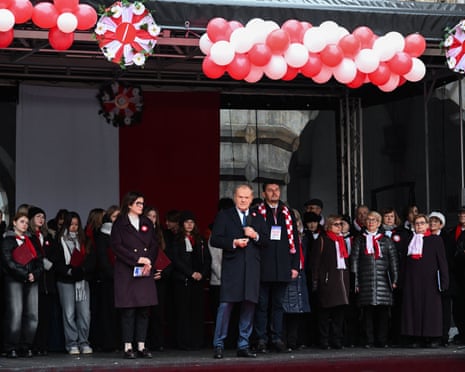
There was also a sports element, with 20,000 runners taking part in the Independence Day Run in Warsaw early morning, and thousands joining other events across the country.
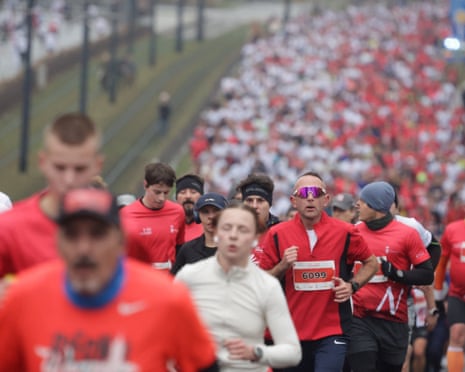
Key events Show key events only Please turn on JavaScript to use this feature
Closing summary

Jakub Krupa
… and on that note, it’s a wrap!
68-year-old Catherine Connolly has inaugurated her term as the 10th president of Ireland, saying she wants to be “a steady hand” and “a catalyst for change,” “reflecting our desire for a republic that lives up to its name” (13:00, 14:02, 14:25). She also warned against “existential” threats from climate change and armed conflicts, stressing Ireland’s neutrality (13:48, 13:51, 13:54, 14:01).
Around 100,000 people, including Poland’s president Karol Nawrocki, have taken part in the controversial Independence March in the Polish capital of Warsaw this afternoon, according to early police estimates, as the country celebrated 107th anniversary of its independence (15:03, 15:33, 16:01, 16:56).
Thousands also took part in Armistice Day commemorations in France, led by French president Emmanuel Macron (11:38).
And happy birthday to German chancellor, Friedrich Merz, who turns 70 today, and hosts a big birthday bash this evening as he faces growing questions about his track record in government (16:40).
And that’s all from me, Jakub Krupa, for today.
If you have any tips, comments or suggestions, email me at jakub.krupa@theguardian.com.
I am also on Bluesky at @jakubkrupa.bsky.social and on X at @jakubkrupa.
100,000 people taking part in Polish Independence March, authorities say
Warsaw police estimate that around 100,000 people are taking part in the Independence March in the Polish capital (15:03), Poland’s public broadcaster TVP said.
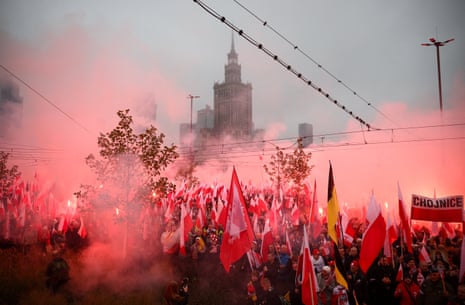
Germany's chancellor Merz turns 70 with growing scrutiny on his track record in office
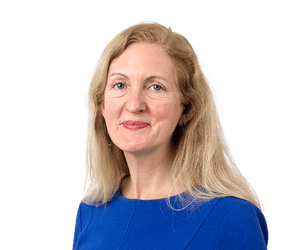
Deborah Cole
in Berlin
Germany’s chancellor Friedrich Merz celebrates his 70th today, making him the oldest head of government in the EU and joining global septuagenarian leaders club including China’s Xi Jinping and presidents Donald Trump of the US and Vladimir Putin of Russia.
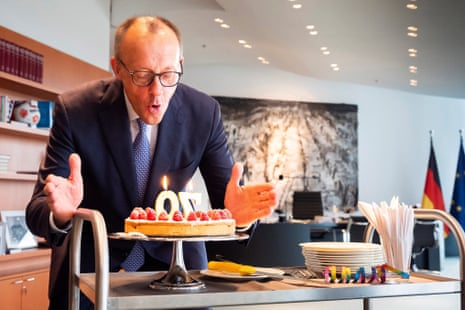
Taking a beating in opinion polls and facing stiff competition from the far-right Alternative für Deutschland, Merz told media he would treat it as a “normal work day”.
After a slightly extended breakfast with his wife, Charlotte, Merz reported to his desk at the chancellery in central Berlin and from 5pm will join a reception of 300 of his closest political allies and a few family members.
Former chancellor Angela Merkel, a Christian Democrat who governed Germany for 16 years, was originally not on the guest list. Her office last month confirmed the snub. “Former chancellor Dr Merkel would not be able to attend anyway due to a trip abroad.” She is in Israel this week to accept an honorary doctorate.
A spokesperson for the former chancellor said an invitation later arrived and Merkel sent him a handwritten birthday greeting.
Merz and Merkel have been locked in a bitter political rivalry for more than 20 years after she iced him out of key posts, leading him to quit politics for over a decade.
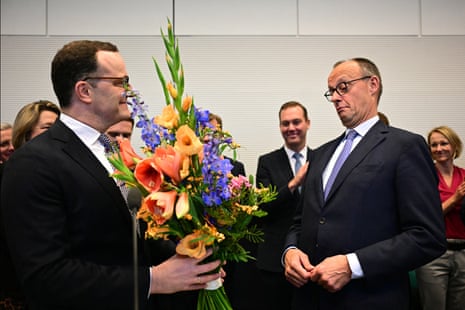
Since he took office in May, Merz has touted his hardline immigration stance as an intentional break with Merkel’s “We can do it” welcome at the height of the 2015-16 refugee influx. Merkel has repeatedly voiced criticism of his border policy and views on integration.
Merz has reserved this evening for loved ones. “As a family person, I look forward to celebrating my birthday with my wife, the children and grandchildren,” he said.
He is the first German chancellor to turn 70 in office – postwar West German leader Konrad Adenauer was elected at 73 – and attributes his relatively youthful appearance to cycling, golfing and eating well.
“I basically don’t drink alcohol any more,” he told the Rheinische Post newspaper.
While he says he works 16 hours a day, he reserves six hours for sleep and tries to get out in the fresh air in his home region of Sauerland on weekends.
With the economy in the doldrums and the ruling coalition with the Social Democrats at loggerheads, political consultant Johannes Hillje put Merz’s weakness in office not down to clearing the 70 mark but to his often impulsive rhetoric, leading to a German neologism merzen, meaning talking big with little to show for it.
“This discrepancy between rhetoric and results has nothing to do with his age, but rather with his character,” he told public broadcaster rbb. “But I believe he needs to find a better balance, because so far this has caused a great deal of frustration and disappointment.”
German man with alleged neo-Nazi links arrested over darknet assassination calls

Deborah Cole
Germany’s chief federal prosecutor has announced the arrest of a German-Polish national with alleged neo-Nazi ties who is accused of calling on the darknet for the assassination of top politicians and seeking donations for bounties on their heads.
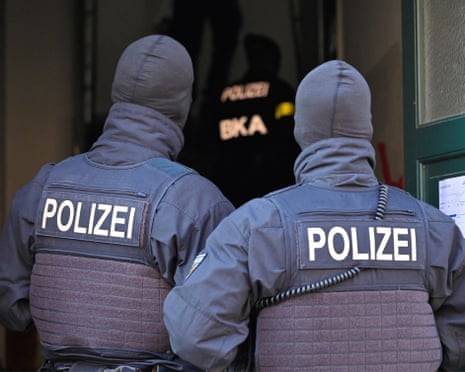
More than 20 people were on the list of potential targets, including former chancellors Angela Merkel and Olaf Scholz as well as judges and ex-government ministers, local media reported.
On his platform Assassination Politics, the 49-year-old suspect, identified only as Martin S, is alleged to have published personal data of prominent people as well as “charge sheets” and “death sentences”.
The suspect, who was arrested late on Monday in the western city of Dortmund, where he lives with his family, faces charges including financing terrorism, inciting others to commit a serious act of violence that endangers the state and committing the dangerous dissemination of personal data.
Lithuanian minister recommends refusing offer of talks with Belarus on border crossings
Lithuanian foreign minister Kęstutis Budrys said he recommended refusing talks with Belarus on reopening border checkpoints between the countries, after Belarus’ president told his foreign minister to hold talks with Lithuania on the matter, Reuters reported.

The border crossings between Lithuania and Belarus will remain closed for most travellers until the end of November in response to recent airspace disruptions from smugglers’ balloons, Lithuania said earlier.

Jakub Krupa
Let’s now take a look at other events across Europe.
Polish Independence March in Warsaw - in pictures
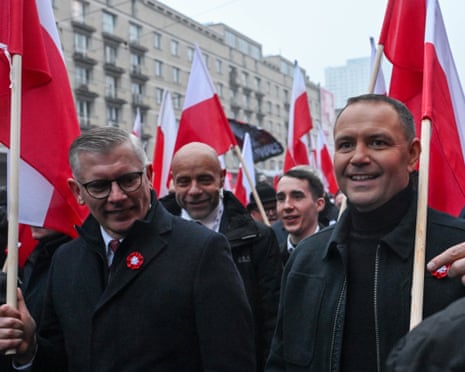

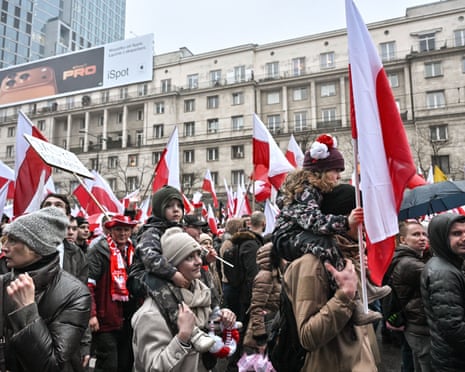

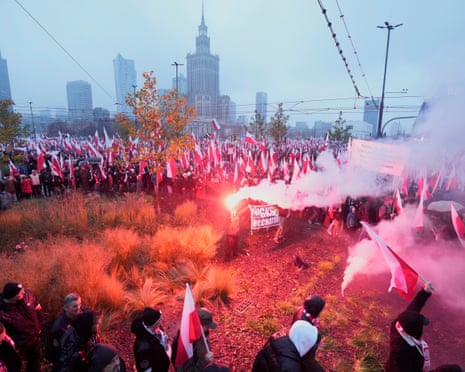

To give you a better idea of the atmosphere at the Warsaw demonstration, Sławomir Mentzen, leader of the far-right Confederation party which is involved in its organisation, said in a social media post that “the crowds at the Independence March are showing their devotion to the Fatherland.”
“We are proud to be Poles and will always defend our nation against foreign powers! Long live a strong, proud, and independent Poland!”
He also posted a picture of himself standing with a red hand flare in front of a banner, saying:
“Poland demands today – send Tusk back to Berlin!”
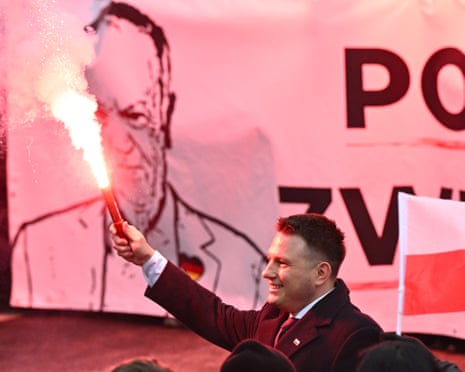
The banner refers to the conservatives and far right’s criticism of prime minister Donald Tusk’s approach to Polish-German relations.
Mentzen came third in the Polish presidential election in May, with 14.8% of the vote, and could play a key role in the government-forming process after the next parliamentary election in 2027.

Jakub Krupa
Poland’s conservative nationalist president Karol Nawrocki is now confirmed as taking part in the Independence March, posting a video of himself walking the streets of Warsaw with a white-red flag as part of the procession.
In contrast, his predecessor, conservative Andrzej Duda, steered clear of the event, joining it only once – in 2018 – when it was part of a larger, 250,000-strong and partially state-organised commemoration of Poland’s 100 years of independence.
Crowds gather in Warsaw as controversial Independence March gets under way

Jakub Krupa
Meanwhile over in Poland, tens of thousands of people are taking part in the Independence March in Warsaw, organised primarily by nationalist and far-right groups under the slogan “One nation, strong Poland.”

Despite the solemn occasion of the 107th anniversary of the Polish independence day, the event continues to deeply polarise the general public as it attracts thousands of conservatives Poles willing to celebrate the country’s history, but also fringe, far-right and radical groups.
An SW Research poll for Rzeczpospolita showed that 45% of Poles have a positive view of the march, but 28% is of the opposite view. 26% have no opinion about the event.


Some far-right slogans can be also seen on flags carried on the fringes of the march, including “Stop immigration, time for deportation.”
In the past, the event had been marred by violent clashes with police and counterprotesters, with controversies about reported attendance of other far-right groups from across Europe.

Official state commemorations took place earlier today, with president Karol Nawrocki and senior government ministers taking part in a formal ceremony at Piłsudski Square in Warsaw.
Earlier in the morning, Nawrocki also laid wreaths at monuments commemorating Poland’s founding figures, and he was expected to join the march during the afternoon.


Poland’s prime minister Donald Tusk attended a separate event in his home town of Gdańsk.

There was also a sports element, with 20,000 runners taking part in the Independence Day Run in Warsaw early morning, and thousands joining other events across the country.

Connolly’s inaugural address as Ireland's president – snap analysis
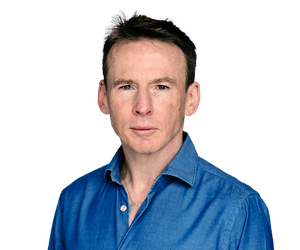
Rory Carroll
in Dublin
A finely balanced inaugural address by Ireland’s new president.

Catherine Connolly’s reference to the “dominant narrative” excluding “critical thinking”, and not addressing people’s concerns, was a coded rebuke to some government policies. So too was the reference to housing being a fundamental right in the context of a severe housing shortage.
Her lauding of Irish neutrality can be interpreted as a marker to a government that is eying engagement with European security initiatives.
Overall, however, Connolly stayed within the boundaries of the largely ceremonial position.
Her conclusion (14:02) continued that balancing act.
And in one of Connolly’s engagements in her new role, we are getting a flypast above the Dublin Castle!
She then proceeds to inspect the guard of honour.

 2 hours ago
2 hours ago
